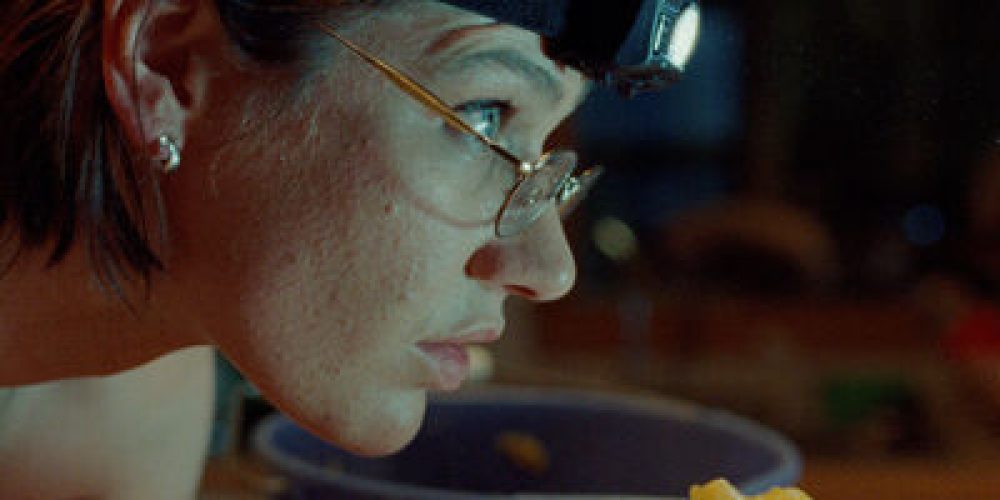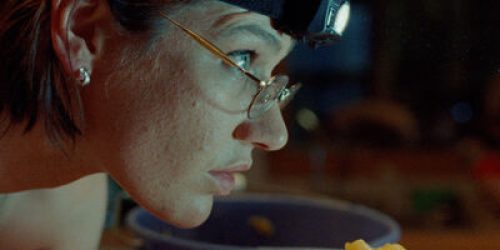One of the many admirable things about TIFF is how much the programmers support the film industry in their own country, usually spotlighting upcoming filmmakers in their Discovery or Canadian World Cinema programs. TIFF is such a major event that they could merely fill a program with red-carpet events with household names, but the programmers are always careful to include works from Canadian filmmakers, and three of those that I was able to screen this year have an undeniably Canadian voice. Sadly, they’re a mixed bag in terms of quality, all having elements that work but filmmakers who can’t quite figure out how to bring them together into a cohesive, successful product overall.
The best of the three is Sophie Jarvis’ often dreamlike “Until Branches Bend,” the story of a young woman who makes a decision that will impact her entire community. With echoes of everything from Kelly Reichardt’s work to Todd Haynes’ “Safe,” this is a film that’s at its best when it’s playing more with mood than traditional narrative. It unfortunately resorts to the latter too often, but there are dreamlike sequences in which Jarvis really captures cinematically how it feels to emotionally and possibly mentally unravel.
The excellent Grace Glowicki plays Robin, a worker at a cannery in the Okanagan, a region where changes a produce haul could impact the entire economy of the community. And so, when Robin finds a beetle in one of the peaches at the cannery, she realizes that this bug could foretell the downfall of everything around her. She brings it to the attention of her boss (Lochlyn Munro), who does what so many people in power do when they’re face with potential economic disaster: pretend it’s not there. When Robin escalates the situation, the community turns on her, pushing her to the brink of sanity.
Jarvis shot “Until Branches Bend” on 16mm, and the choice richly captures the beauty of the region and the potential threat that hangs in the air around it. We know that Robin did find that beetle, and so there’s almost a ticking clock element to “Until Branches Bend” that gives it the tone of a thriller. Some of the supporting performances are under-directed and the relationship with Robin’s sister Laney (Alexandra Roberts) is under-written, but when Jarvis and Glowicki are really clicking on what plays like an apocalyptic character study, this movie works.
There are moments when Marie Clements’ “Bones of Crows” has a similar lyrical power, mostly when star Grace Dove is on screen, but this movie has an unusual problem—it’s a film that’s a calling card for a mini-series. There’s a long history of people making short films to get the financing to develop them into a full-length feature, but I’m not sure I’ve ever seen before a film that’s already being reworked into a mini-series. And you can definitely tell. Spanning generations, “Bones of Crows” lacks focus and gets frustrating as it has to constantly play the emotional peaks of so many major life moments, ones that will be better spread out over the length of multiple episodes.
The excellent Dove is only one of the women who plays Aline Spears, a legend of the Cree people who has worked to cast a light on the horrendous treatment of Indigenous Canadian people who were stolen from their homes and sent to Residential Schools, where many of them were abused and even murdered. Born in the 1920s, Spears was pulled from her family and sent to one of these religious institutions, one of many places that saw Indigenous children as less than human.
Her legend grew during World War II when Spears used her Cree fluency to help craft a coded system for the military. The very history that her persecutors at the school had literally attempted to beat out of Spears helped save lives. She would return home to raise a family in Canada, but her fight to bring the issue of the Residential Schools all the way to the Vatican in 2021 would make international headlines.
Clearly, there’s a lot of story to tell here, and Clements finds powerful moments in Dove’s undeniable depth as a dramatic actress. But her film is just too often unwieldy or melodramatic, the kind of thing that needed more room to breathe, which it will likely get in a series form.
Finally, there’s Gail Maurice’s sweet-but-shallow “ROSIE,” a gentle character study about life on the edge of society in Montreal in the 1980s, seen through the eyes of an orphaned Indigenous girl. When Rosie’s (Keris Hope Hill) mother dies, she’s left adrift, with no place to call home. She ends up at the home of her aunt Frédèrique (Mélanie Bray), someone who barely seems interested in taking care of herself, much less a little girl. She works at an adult entertainment shop and hangs out with two gender-fluid friends named Flo (Constant Bernard) and Mo (Alex Trahan). It’s not exactly the normal place to raise a kid.
Of course, those are often the kind of places that are great settings for coming-of-age stories. “ROSIE” isn’t quite that; in fact, Rosie herself often is a bit too much like an afterthought as Maurice seems more interested in “Fred” and her colorful friends than what’s going on in the heart or mind of her title character. And so “ROSIE” is at its best when it’s allowed to just be a quirky hangout movie, yet another tale of an unexpected family. When it has to get back to a traditional narrative, it’s a little too familiar, safe, and, well, boring. Bray is good, but I wanted Maurice to challenge her in a way that wasn’t so predictable. Maybe that will happen in the next TIFF selection of Canadian dramas.
One of the many admirable things about TIFF is how much the programmers support the film industry in their own country, usually spotlighting upcoming filmmakers in their Discovery or Canadian World Cinema programs. TIFF is such a major event that they could merely fill a program with red-carpet events with household names, but the programmers are always careful to include works from Canadian filmmakers, and three of those that I was able to screen this year have an undeniably Canadian voice. Sadly, they’re a mixed bag in terms of quality, all having elements that work but filmmakers who can’t quite figure out how to bring them together into a cohesive, successful product overall. The best of the three is Sophie Jarvis’ often dreamlike “Until Branches Bend,” the story of a young woman who makes a decision that will impact her entire community. With echoes of everything from Kelly Reichardt’s work to Todd Haynes’ “Safe,” this is a film that’s at its best when it’s playing more with mood than traditional narrative. It unfortunately resorts to the latter too often, but there are dreamlike sequences in which Jarvis really captures cinematically how it feels to emotionally and possibly mentally unravel. The excellent Grace Glowicki plays Robin, a worker at a cannery in the Okanagan, a region where changes a produce haul could impact the entire economy of the community. And so, when Robin finds a beetle in one of the peaches at the cannery, she realizes that this bug could foretell the downfall of everything around her. She brings it to the attention of her boss (Lochlyn Munro), who does what so many people in power do when they’re face with potential economic disaster: pretend it’s not there. When Robin escalates the situation, the community turns on her, pushing her to the brink of sanity. Jarvis shot “Until Branches Bend” on 16mm, and the choice richly captures the beauty of the region and the potential threat that hangs in the air around it. We know that Robin did find that beetle, and so there’s almost a ticking clock element to “Until Branches Bend” that gives it the tone of a thriller. Some of the supporting performances are under-directed and the relationship with Robin’s sister Laney (Alexandra Roberts) is under-written, but when Jarvis and Glowicki are really clicking on what plays like an apocalyptic character study, this movie works. There are moments when Marie Clements’ “Bones of Crows” has a similar lyrical power, mostly when star Grace Dove is on screen, but this movie has an unusual problem—it’s a film that’s a calling card for a mini-series. There’s a long history of people making short films to get the financing to develop them into a full-length feature, but I’m not sure I’ve ever seen before a film that’s already being reworked into a mini-series. And you can definitely tell. Spanning generations, “Bones of Crows” lacks focus and gets frustrating as it has to constantly play the emotional peaks of so many major life moments, ones that will be better spread out over the length of multiple episodes. The excellent Dove is only one of the women who plays Aline Spears, a legend of the Cree people who has worked to cast a light on the horrendous treatment of Indigenous Canadian people who were stolen from their homes and sent to Residential Schools, where many of them were abused and even murdered. Born in the 1920s, Spears was pulled from her family and sent to one of these religious institutions, one of many places that saw Indigenous children as less than human. Her legend grew during World War II when Spears used her Cree fluency to help craft a coded system for the military. The very history that her persecutors at the school had literally attempted to beat out of Spears helped save lives. She would return home to raise a family in Canada, but her fight to bring the issue of the Residential Schools all the way to the Vatican in 2021 would make international headlines. Clearly, there’s a lot of story to tell here, and Clements finds powerful moments in Dove’s undeniable depth as a dramatic actress. But her film is just too often unwieldy or melodramatic, the kind of thing that needed more room to breathe, which it will likely get in a series form. Finally, there’s Gail Maurice’s sweet-but-shallow “ROSIE,” a gentle character study about life on the edge of society in Montreal in the 1980s, seen through the eyes of an orphaned Indigenous girl. When Rosie’s (Keris Hope Hill) mother dies, she’s left adrift, with no place to call home. She ends up at the home of her aunt Frédèrique (Mélanie Bray), someone who barely seems interested in taking care of herself, much less a little girl. She works at an adult entertainment shop and hangs out with two gender-fluid friends named Flo (Constant Bernard) and Mo (Alex Trahan). It’s not exactly the normal place to raise a kid. Of course, those are often the kind of places that are great settings for coming-of-age stories. “ROSIE” isn’t quite that; in fact, Rosie herself often is a bit too much like an afterthought as Maurice seems more interested in “Fred” and her colorful friends than what’s going on in the heart or mind of her title character. And so “ROSIE” is at its best when it’s allowed to just be a quirky hangout movie, yet another tale of an unexpected family. When it has to get back to a traditional narrative, it’s a little too familiar, safe, and, well, boring. Bray is good, but I wanted Maurice to challenge her in a way that wasn’t so predictable. Maybe that will happen in the next TIFF selection of Canadian dramas. Read More


